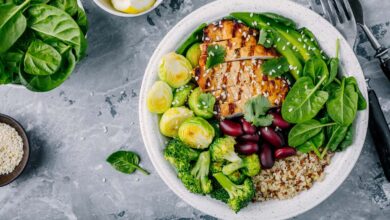Budget-Friendly Nourishment: Savoring Nutritious Delights Without Breaking the Bank

Eating well on a budget can be challenging. A healthy diet is important for physical and mental well-being, but finding affordable and nutritious food can be tough when money is tight. Limited budgets often lead to relying on processed and fast food, which may be convenient but lack essential nutrients and are high in calories, sugar, and preservatives.
Contrary to popular belief, these options are not necessarily cheaper than home-cooked meals. However, there are ways to enjoy and incorporate healthy snacks and salads without spending a fortune. Prioritizing local, unprocessed ingredients, cooking at home, and minimizing waste can lead to a healthier, tastier diet while saving money.
- Prioritize whole foods
While convenience foods may save you time, they typically have a higher price tag. For instance, purchasing a block of cheese and grating or slicing it yourself is more economical than shopping for bags of pre-grated cheese or processed cheese slices.
This approach also allows you to avoid additives used to prevent caking. Similarly, buying a whole head of lettuce, washing and chopping it yourself, is cheaper than buying pre-packaged bagged salad. Moreover, homemade salads tend to stay fresh for a longer period.
- Consider frozen fruits and vegetables.
Frozen produce is just as nutritious as fresh alternatives and maintains its taste while often being more affordable. Opt for larger frozen bags if you have freezer space, as they usually provide the best value.
- Opt for generic or store brands.
When shopping at regular grocery stores, the store’s brand or generic options are often cheaper than their name-brand counterparts while maintaining a similar level of quality.
- Find simple ways to save money throughout the day.
Instead of purchasing a morning coffee on your way to work or school, try brewing your coffee at home. Rather than buying breakfast or lunch, prepare your meals using leftovers or homemade salads, sandwiches, or boiled eggs.
- Buy in bulk
Purchasing non-perishable items, such as canned fish or dried beans, in bulk can save you money and time spent shopping. If you have enough storage space, store bulk-bought cereals and grains in airtight containers and freeze those perishable items like meat and bread in smaller portions for use. Alternatively, you can split bulk purchases with a friend, benefiting both of you financially.
- Shop for seasonal produce and buy in larger quantities
Seasonal produce tends to be cheaper, tastier, and more nutritious. It’s also often more economical to buy fruits and vegetables like apples, oranges, grapefruits, potatoes, and onions in bags rather than individually, as long as you can consume them before they spoil.
- Be mindful of hidden sugars.
Most packaged foods have high amounts of hidden sugar, leading to sudden energy swings and blood sugar fluctuations and serious health problems. Avoid white bread, canned soups, instant mashed potatoes, and sugary cereals.
- Opt for water instead of soda.
Water is cost-free and can be enhanced with natural flavors by adding slices of lemon, lime, or orange, providing a refreshing variety.
Opting for nutritious food instead of processed meals doesn’t have to inflate your weekly expenses. It’s important to remember that junk food often comes with hidden costs beyond the price on the label.
A poor diet can negatively impact your health, increasing medical expenses, medication costs, reduced energy levels, and decreased productivity. However, by making wise choices regarding food, you can save money and safeguard your well-being.



